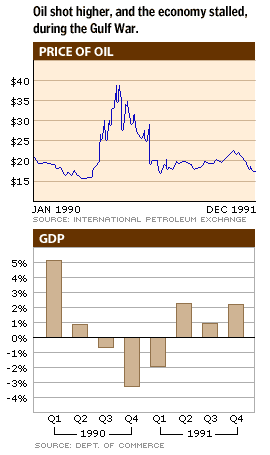NEW YORK (CNN/Money) - All around Wall Street Thursday morning trading desks turned off the mute button and tuned in to President Bush's speech at the United Nations.
But you might not have guessed that the speech had been the most hotly waited-for event of the week by looking at stock prices tick by as Bush made his case for moving against Iraq. When he began talking, the Dow Jones Industrial Average was down 138; when he wrapped up, it was down 140 -- a two-point move.

Why such a muted reaction to a speech where the U.S. President pledged his country will not "stand by and do nothing while dangers gather"? Because traders have long since decided that action against Iraq is inevitable, and these expectations have already depressed prices.
"There hasn't been a big reaction to Bush because it's fairly well factored in," said Jim Volk, director of institutional trading at D.A. Davidson. "The market will likely show some reaction to actual military action, but on balance it's priced in."
The idea of pricing in war is strange, to be sure. To say stock prices already reflect some future event -- like a Fed meeting or an earnings release -- is to say that investors are already sure of the probable outcome. But even in an age of military precision we know that war can open up a Pandora's box of unforeseen consequences.
"The idea that there is going to be a war is thoroughly accepted in the financial markets right now," said Bill Sterling, chief investment officer at Trilogy advisors. "But nobody can know what the exact contours are going to be."
Still, markets are about betting on future outcomes and in trying to figure out how war with Iraq might proceed traders have an old playbook -- the Gulf War -- that may not be entirely out of date. The base case in the market is that any action, once started, will be similarly swift. On Jan. 15, 1991 the UN deadline for Iraqi withdrawal from Kuwait passed. Allied forces struck against Iraq on Jan. 17, and on Feb. 28 there was a cease fire. As it became clear the war would not be protracted, stocks ran higher; between Jan. 15 and Feb. 28 the S&P 500 rose 17.2 percent.
"I personally think that it's going to be quick, that the Iraqi army will join the Italian army in historical folklore," said Sterling. In World War II Italian soldiers quickly proved to be as disgusted with Benito Mussolini as anyone else, turning out to not be nearly the threat that the Allies feared.
A fast outcome could quickly shift down oil prices, said Sterling. With Saddam Hussein out of power, Iraqi oil exports -- curtailed by UN sanctions for over a decade -- could flow again. Everybody expects that oil prices would hop when a conflict begins, but they could quickly be down below $20 a barrel (from the current $28). Lower oil prices could, in turn, boost a sluggish world economy.
But Brooks Tucker, an associate in Deutsche Bank Alex.Brown's private client division who served in a Marine infantry battalion during the Gulf War, is not so sure the market is right to use the old playbook.
"The market priced in the fact that we could go to war, but it hasn't priced in the duration and the possible costs in human capital and military resources if things don't go as well as some people expect they will," he said.
"We'll prevail, but it could get hairy over there. Iraq does have some pretty loyal troops, and they're going to be defending the homeland now, not some emirate they don't care too much about."

|

